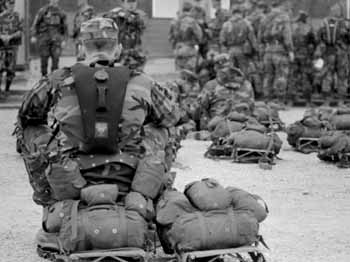Field Maneuvers
Camp Williams, in Draper, Utah, was the ground on which nearly 350 students from six universities in Utah united in training and leadership exercises as Army ROTC (Reserve Officer Training Corps) cadets. Operation Wasatch Thunder took action on March 22 to 24.
Maj. Matt Garner, the public affairs officer, said the name Wasatch Thunder was chosen because the cadets were from universities in Utah, and Thunder was a good Army name. Universities who attended included Utah State University, Weber State, The University of Utah, Utah Valley State College, BYU and Southern Utah University, Garner said.
Freshmen and sophomore cadets attended Wasatch Thunder as an introduction to the ROTC program, Garner said. Juniors participated in a type of advanced laser tag where aircraft and Army tanks were also involved and supplied with laser tag equipment. Senior cadets were evaluated for their leadership skills decided which branch of the United States Army they wanted to serve in.
“We put them in different positions and put a little bit of stress on them and see how they react,” he said.
Cadet Andrew Pedersen, a sophomore studying flight at USU, said, “If I go active I hopefully want to be an Apache helicopter pilot to fly the troops in and out of places.”
Army ROTC divides priorities into three missions, he said.
“We want to be safe, that’s always the first thing. We want to recruit and retain the people that we have in the program already and lastly we just want to have fun and make sure we get good training out of it,” he said.
“We’re switching off a lot of the leadership positions so people get the opportunity to lead and so everyone gets a feel for what it’s going to be like when they are really an officer,” Pedersen said.
A lot of people are ignorant about the military, he said. There are many benefits such as money for school, learning experiences about life and traveling the world. It’s not just going to be 0war and dying, he said.
“The military is such a rewarding thing for me,” he said.
Forced entry, the firing range and paintball all took place at a MOUT (Military Operations in Urban Terrain) site, Garner said.
“It’s demanding, [but] a great way to train,” he said.
Cadet Remington Curtis, a sophomore at USU majoring in public health, said, “[ROTC] gives me leadership skills so I can be in charge [when] I get in my field.”
Teams of cadets throw grappling hooks into the second story windows of a building. In this exercise the entire group must climb the rope and, using teamwork, get everyone inside within a certain time limit. This training exercise taught him how to listen to his leaders, he said.
“It teaches you the importance of upper body strength,” Curtis said.
Cadet Benjamin Pedersen, a sophomore studying flight technology at USU, said, “I’ll commission after graduation and I hope to go aviation and fly helicopters. Apaches are the most exciting so I might as well.”
Benjamin and his older brother Andrew are both going in the same direction to be helicopter pilots, he said.
Benjamin is also enlisted with the Army National Guard, and his unit is stationed at Camp Williams. In basic training, there was a contest to see who could hit the best out of 40 targets. He hit 38, which was more than anyone else in the entire company, he said.
“Besides just skill and accuracy with using a weapon, it teaches you discipline – people might think you just grab a weapon and you go out there and shoot, but there’s lots to it, your breathing, you want to get in a rhythm, your aiming, [and] your steadiness,” Benjamin said.
Cadet Patrick Magill, a junior majoring in sociology at USU, said he enjoyed the paintball war.
“The purpose of paintball is that it teaches tactical movements- how to react when people are firing at you. It just teaches ways to move in a hostile environment,” he said.
“All these exercises teach us leadership skills and to have a good time, to hang out with your friends. [I get to] hang out with my friends Ben and Andy [Pedersen],” Magill said.
Cadet Mike Christensen, a junior at USU majoring in marketing, said, “There’s a lot of business in the military. There’s a lot of networking, and just like any professional career you’re applying, you’re meeting people, you’re going before a board which would be the same as going before a human resource department in any business.”
He said the Army is run much like any other business but has a different organizational core.
“Some of these urban tactics we’ll do. These firing ranges and some of this stuff they’ll [first-and second-year cadets] do, that they wouldn’t even do just by enlisting into a normal unit,” Christensen said.
Garner said the purpose for Wasatch Thunder is to train cadets for the summer course called advanced camp. This camp is the National Advanced Leader’s Course, which takes place at Ft. Lewis, Wash., for 32 days.
Cadets are evaluated on their responsibility and leadership skills, Garner said.

BYU student and cadet Jeff Holdaway rests before he begins a three-hour course designed to test his orienteering skills. (Zak Larsen )

